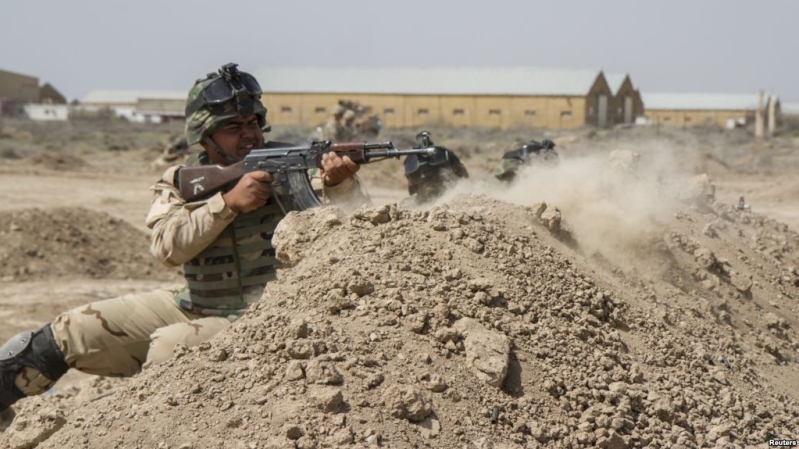
The United States has stepped up its efforts in the fight against ISIS by sending 450 military advisers to Iraq. President Barack Obama made the announcement on Wednesday.
According to Greg Jaffe and Missy Ryan of the Washington Post, the additional troops are being sent to aid Iraqi Prime Minister Haider al-Abadi, who is trying to reach out to disaffected Sunnis and boost the Iraqi army, which has performed dismally in the fight against ISIS. U.S. officials thought a weakened Abadi would enable predominantly Shia Iran to strengthen its position in the region in what has played out as a sectarian war against the Sunni ISIS.
"The trend lines [for Abadi] are not good," senior fellow Doug Ollivant of the New America Foundation said. "He needs a win - and preferably a string of two or three of them."
The Washington Post reported that Obama's plan would place U.S. military advisers inside the Iraqi headquarters overseeing the offensive to retake Ramadi and the surrounding Anbar province, both of which fell to ISIS control. However, the president won't allow the advisers to get any closer to the front lines on the belief that it was a fight the Iraqis had to win for themselves.
"Neither does the new deployment include forward air controllers, who could direct airstrikes from U.S. bombers," Jaffe and Ryan wrote. "It also does not envision the use of Apache attack helicopters, which are among the most lethal weapons in the U.S. arsenal in urban combat."
Senior Middle East analyst Brian Katulis, who works for the left-leaning Center for American Progress, told the Washington Post that "the loss of Ramadi needed a response."
"I see this as more of a tactical shift," Katulis said. "The focus is still on getting the Iraqis to pull their own weight. It is important but largely tactical."
However, Mark Thompson of Time claimed that U.S. "lily pad" strategy to beat ISIS in Iraq has previously failed in the fight against the Taliban in Afghanistan. Army Gen. Martin Dempsey, chairman of the Joint Chiefs of Staff, elaborated on the strategy.
"Our campaign is built on establishing these 'lily pads' that allow us to encourage the Iraqi security forces forward," Dempsey said. "As they go forward, they may exceed the reach of the particular lily pad."
Thompson reported that the "lily pad" strategy has been used before; they were also called "oil spot" or "ink blot" strategies. The military strategy was first popularized by retired Army Lt. Col. Andrew Krepinevich in an article written back in 2005.
"Since the U.S. and Iraqi armies cannot guarantee security to all of Iraq simultaneously, they should start by focusing on certain key areas and then, over time, broadening the effort-hence the image of an expanding oil spot," Krepinevich wrote.
According to Thompson, this strategy meant that the U.S. would have five bases in Iraq.
"We're looking all the time to see if additional sites might be necessary," Dempsey said. "I could foresee one in the corridor that runs from Baghdad to Tikrit to Kirkuk over into Mosul."
Thompson pointed out that the effectiveness of the lily pads in Afghanistan has shrunk to the point that it has significantly impacted the safety of Americans within that country.
"Americans can only really travel safely in Kabul, and for most part no travel outside of green zone in Kabul," a U.S. official said about travel conditions in the Afghan capital. "Helicopters are needed to travel less than a mile from the embassy to airport."
However, the Washington Post reported that the president is standing by his decision and strategy, praising Abadi for his commitment to a "political agenda of inclusion" despite acknowledging that Abadi may have weakened support among Shiites.
"He's inheriting a legacy of a lot of mistrust," Obama said. "He's having to take a lot of political risks."
Elissa Slotkin, assistant secretary of defense for international security affairs, told the Washington Post that it was "critically important to get the Sunnis in the main security forces."
"That's another reason we want U.S. forces on the ground, to help facilitate that conversation," Slotkin said.







